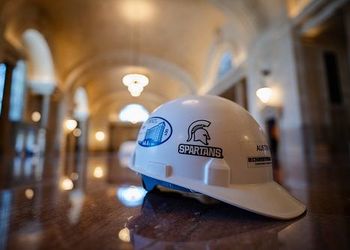Feature: Debbie Stabenow: A Spartan in the U.S. Senate

Debbie Stabenow, ’72, M.S.W. ’75, the first woman senator from Michigan, is blazing quite a trail on Capitol Hill.
Elected in 2000 to the “nation’s most exclusive club,” she is currently one of only 14 women senators. But even more notable, Stabenow is the only woman in history to have served at the local level, in both state legislatures, and in both the U.S. Congress and Senate. Though still in her first term, Debbie sits on three Senate committees, including the powerful budget committee. At one time, she became the first freshman ever to manage the $1.8 trillion budget resolution on the floor. It was highly unusual move, but it spoke volumes about her skill and knowledge.
Debbie has been at the forefront on many health care issues, especially the cost of prescription drugs, and is currently spearheading the drive to oppose President Bush’s attempt to privatize a component of social security. She has also fought for many issues directly impacting Michigan, such as banning the importation of Canadian trash, forbidding drilling in the Great Lakes, checking ship ballasts to make sure no invasive species contaminate the Great Lakes, and creating incentives for manufacturers to keep jobs at home. She has also been a strong friend of the consumer, working to create a financial literacy commission and to make free credit reports available to every adult. Needless to say, her increasing clout in national affairs can only help Michigan’s interests, not just in regard to Michigan jobs and healthcare, but also the state’s huge agricultural economy.
Last November, she was named Democratic caucus secretary—the minority party leadership’s third highest ranking position.
“That’s a huge feather in her cap,” notes veteran Michigan Senator Carl Levin, in his fifth term. “It shows a great deal of confidence in her.”
It’s a sunny Tuesday morning in March. The Cherry blossoms are in full bloom throughout Washington, D.C. By 8 a.m., more than three dozen people have gathered in her office on the first floor of the Hart Senate Office Building, kitty corner from the U.S. Capitol. Artwork depicting Michigan hang on the walls. Welcome to “Good Morning, Michigan,” an hour-long opportunity every Tuesday for Michiganians to meet Debbie in her office, to put forth their issues, and to have their photo taken with her.
The visitors range from tourists to representatives of specific groups and issues, such as the American Heart Association, war veterans, health care, and shopping centers. With staff members expediting the traffic circulation, Debbie turns on what People magazine calls her “warm, fuzzy persona.” As Levin puts it, “She’s very accessible to people back home, she listens well and always tries to respond. She has a wonderful personality. People love her.”
Within an hour, all visitors have had their moment with Debbie. One last photo op is squeezed in for a young lady identified as Michigan’s “2005 River Raisin Festival Queen.” The photos will be posted at stabenow.senate.gov for a week. At 9 a.m., Debbie rushes out of her office, goes down one floor and takes the subway tram to the Capitol, where she will attend the weekly meeting with the Democratic leadership—including minority leader Harry Reid, minority whip Dick Durbin, and New York senator Chuck Schumer. An aide directs her to the LBJ Room, a last minute change of venue.
“The meeting should last about an hour,” notes Dave Lemmon, her director of communication. “It could take a bit longer. But she will be back by 10:30 a.m. She has a scheduled phone call that she absolutely must make.”
She does make it back in time for the all-important phone call. It was with Lou Anna K. Simon, president of Michigan State University, her alma mater.
“Mainly we talked about the Farm Lane underpass project,” Debbie discloses. “I talk regularly with MSU about many issues. We talk often about a strategy for bringing the RIA (Rare Isotope Accelerator) Project to MSU. As you know, it’s between MSU and a research facility in Illinois. We believe that MSU is a more advantageous site because of their international expertise as well as all the educational spin-offs that can be achieved with the students.”
From 10:45 a.m. till 12:30 p.m., Debbie holds private meetings with four specific groups representing financial services, the automotive industry, the snowmobilers association, and researchers from the University of Michigan—taking a quick break in between to pose for a photo with a departing intern.
At 12:30 p.m., it’s back to the LBJ Room at the Capitol for a caucus lunch and some private meetings.
At 2:30 p.m., Debbie was to be in her office to accept the Javits-Wagner-O’Day (JWOD) Award from NISH, a national nonprofit organization that finds employment for those with severe disabilities.
But a vote suddenly loomed, requiring her to stay near the Senate chambers. It’s an amendment dealing with veterans health care. “You always have to keep an eye on what’s happening on the floor,” explains Debbie, who advocates giving more support to veterans health care. “We’re creating more vets every day and our commitment has to go beyond the battlefield.”
The NISH entourage ambles swiftly from the Hart Building to the ornate Senate reception room, a beautiful setting for an awards ceremony. Portraits of such senatorial legends as Henry Clay and John Calhoun adorn the walls. “Our organization has helped find employment for some 42,000 people who are blind or have severe disabilities,” explains Bob Chamberlin, president and CEO of NISH. “Debbie has been one of the most supportive people.”
“You have to have flexibility in this job,” jokes Debbie about the sudden change of venue.
Following the presentation, Debbie keeps her 4 p.m. appointment with legislative representatives from the AFL-CIO.
Normally on Tuesdays, Debbie has to make room for a hearing or two. She sits on three committees—agriculture, banking and budget. The budget committee is considered among the most powerful in the Senate. And she has always been a member of the agriculture committee in both Michigan houses and the U.S. House of Representatives. In 2001, she arranged to have the U.S. Senate agriculture committee meet in Michigan for the first time in 86 years.
But even without a hearing, her work day was full as she had three more receptions on her agenda—one by the American Farm Bureau Women’s Committee in the Longworth Building, one by the Securities Industries Association in the Dirksen Building, and one by the JWOD Program at the Rayburn Building.
“Most people tend to get tired as the day goes on,” notes Lemmon. “But Debbie draws energy from meeting with people and actually gets stronger as the day goes on.”
During a brief break from all the day’s activities, Debbie had time to reflect on being a U.S. Senator. “I absolutely love it,” she says. “I feel blessed. This is not what I planned for a career, but once I got involved (in politics), everything about my career has been issue driven. I feel that as long as I can solve problems for the people in Michigan, this is where I should be.”
A native of rural Clare, the daughter of an Oldsmobile/Cadillac auto dealer and insurance agent, Robert Greer, and a registered nurse, Ann Greer, Debbie and her two brothers grew up playing music together. She plays the piano and was a clarinetist in the Clare High School band and also a majorette, cheerleader and yearbook editor. She was an honors student at MSU, graduating in 1972 with honors and later getting her master’s of social work degree in 1975 (magna cum laude).
“”I love MSU,” recalls Debbie, “I lived in Hubbard Hall and worked as an R.A. for two years.”
To earn spending money, she worked as a folk singer at the Rathskeller Room of the Coral Cables. A couple of years ago, she fulfilled a lifelong dream by singing with Peter, Paul and Mary to raise money for Pete Yarrow’s anti-bullying cause. “Paul (Stookey) mentioned to me that he also attended Michigan State,” she recalls.
A week ago, however, her association with MSU cost her some cherries and other Michigan products. She lost a bet to Senator Kay Hutchison from Texas when the MSU women’s basketball team lost to Baylor in the NCAA final game. “I really wanted to go to the games (both men’s and women’s),” she laments, “but just couldn’t make it work.”
Debbie’s political career began at age 24, while a graduate student at MSU, when she learned that a county commissioner wanted to close a Lansing nursing home. It was the only home that took Medicaid patients. She was incensed. Her then husband, Dennis, suggested that she run against him. She did. Even though he dissed her as “that young broad,” Debbie ultimately won in a landslide.
The win kicked off one of the state’s most successful political careers. Three years later, at 27, Debbie became the youngest person ever to chair the Ingham County Board of Commissioners. In 1979 Debbie won election to the State House of Representatives and served 12 years. In her second year, she became the first woman in Michigan to have a baby while serving in the legislature (daughter Michelle was born in 1980). In 1990 she won election to the State Senate and served for four years. In 1994 she experienced her only political setback, losing in the Democratic gubernatorial primary to Howard Wolpe and then in the gubernatorial race as Wolpe’s Lieutenant Governor candidate. But she rebounded in 1996 with two straight elections to the U.S. Congress. In her 2000 election to the U.S. Senate, she beat incumbent Spence Abraham, ’74 (see Winter 1998), who went on to become President George W. Bush’s Energy Secretary during the president’s first term. Abraham had outspent her $13 million to $8 million, but Debbie won a close election by hammering at health care issues, by advocating for a new prescription drug plan for Medicare and fighting for a Patients’ Bill of Rights.
Since her election, Debbie has notched a surprisingly large number of achievements. For example, the drilling ban in the Great Lakes was the first such federal mandate. She achieved a tax credit for manufacturers—$2 billion in immediate tax relief as incentives for job creation in U.S., rather than overseas. She authored a law requiring new high-tech inspection equipment to be used to search Canadian trash trucks crossing Michigan's border and got a significant funding boost for increasing security along the Northern border. She made all firefighters in Michigan—rather than just 28 percent—eligible for reimbursement for homeland security training. Debbie authored and passed laws to stop identity theft, protect corporate whistleblowers, protect consumer privacy, and stopping unscrupulous lenders from swindling consumers through predatory lending practices. She also authored and passed money laundering provisions in the aftermath of 9-11 to track and shut down terrorist networks.
Some of her work has raised eyebrows. When she decided to oppose the importation of Canadian trash to Michigan, for example, she set up an online petition. More than 165,000 signatures were obtained, setting a new record for online petitions signatures gathered by a member of Congress.
Though Debbie is part of the Democratic Senate leadership, she has been effective working across the aisle. Shortly after the bitter battle for the Senate seat, she supported opponent Spence Abraham’s nomination by President Bush to be Energy Secretary. She works with Republicans on many issues—with John McCain and Chuck Grassley on allowing for the re-importation of prescription drugs from Canada, for example, with Gordon Smith on housing bills, and with Lindsey Graham on trade issues as well as an amendment to restore funds to the Manufacturers Extension Program.
Debbie’s success exemplifies the end-product of a Michigan State education. In elective politics, many Spartans have enjoyed major success. Besides Abraham, Don Riegle, M.B.A. '61, also served in the U.S. Senate—three terms from 1976-94. Michigan Governor John Engler (see Spring 1991, pp. 23-26), '71, was first elected in 1990, succeeding James Blanchard (see Summer 1983, pp. 12-16), '64, M.B.A. '65, who served two terms from 1982-90. In the 1980s, George Ariyoshi, '49, was Governor of Hawaii, while Anthony Earl, '58, was Governor of Wisconsin; and Nancy Dick, '51, was Lt. Governor of Colorado. Countless Spartans—including the graduates of MSU’s decade-old Michigan Political Leadership Program—serve and have served in the U.S. Congress, in state legislatures, at all levels of elective office.
Health care, which first prompted Debbie’s political career, remains a bedrock issue. Just behind her desk is a photo of Jessica Bacchus (daughter of Trisha Luker and her husband Calvin), whose death was clouded by a bitter fight against insurance companies. “It was a horror story,” she notes. During her Senate campaign, Debbie had promised to keep that photo front and center in her office until a patient’s bill of rights is passed.
Many other photos hang in her office, including photos with actors Harrison Ford and Michael J. Fox, MASH’s Mike Farrell, the folk singing group Peter, Paul & Mary, and an animated Muhammad Ali. They all involved appearances at a given charity or cause. There are also photos of her two children, Todd and Michelle, and her husband Tom Athans, who is the executive director of Democracy Radio, a progressive radio production company.
Debbie remains very accessible to her constituents in Michigan, with six statewide offices—in Lansing, Detroit, Flint, Grand Rapids, Traverse City and Marquette—dedicated to solving everyday programs. The two dozen staffers literally answer thousands of phone calls, letters and emails every week. Debbie makes it a point to spend weekends and Congressional recesses in Michigan to stay in touch with voters. Of about 25 staff members who serve in her D.C. office, seven are MSU Spartans. D.C. office manager Mary Topolinski happens to be president of MSUAA’s Metropolitan Washington D.C. regional club.
“The real challenge isn’t the workload or the time crunch, it’s representing ten million people in a very diverse state,” she explains. “I feel it’s important to view this job as a long-distance commute to work. I live in Michigan. It’s my home.”



